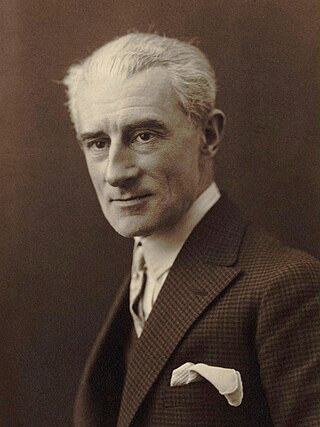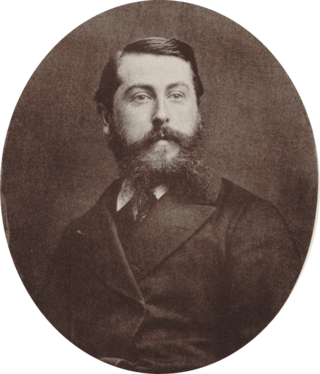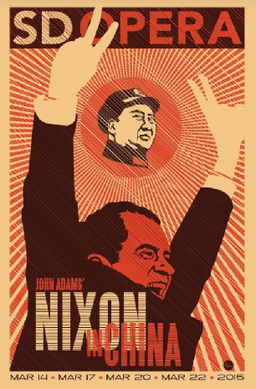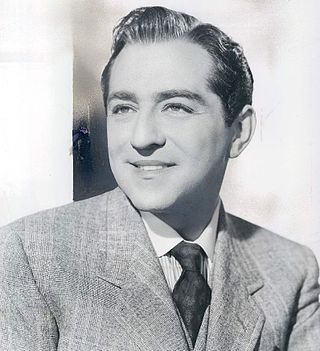Related Research Articles

(Achille) Claude Debussy was a French composer. He is sometimes seen as the first Impressionist composer, although he vigorously rejected the term. He was among the most influential composers of the late 19th and early 20th centuries.

Sir Fred Hoyle FRS (24 June 1915 – 20 August 2001) was an English astronomer who formulated the theory of stellar nucleosynthesis and was one of the authors of the influential B2FH paper. He also held controversial stances on other scientific matters—in particular his rejection of the "Big Bang" theory (a term coined by him on BBC Radio) in favor of the "steady-state model", and his promotion of panspermia as the origin of life on Earth. He also wrote science fiction novels, short stories and radio plays, and co-authored twelve books with his son, Geoffrey Hoyle. He spent most of his working life at the Institute of Astronomy at Cambridge and served as its director for six years.

Joseph Maurice Ravel was a French composer, pianist and conductor. He is often associated with Impressionism along with his elder contemporary Claude Debussy, although both composers rejected the term. In the 1920s and 1930s Ravel was internationally regarded as France's greatest living composer.

Louis-Hector Berlioz was a French Romantic composer and conductor. His output includes orchestral works such as the Symphonie fantastique and Harold in Italy, choral pieces including the Requiem and L'Enfance du Christ, his three operas Benvenuto Cellini, Les Troyens and Béatrice et Bénédict, and works of hybrid genres such as the "dramatic symphony" Roméo et Juliette and the "dramatic legend" La Damnation de Faust.

Brunel University London is a public research university located in the Uxbridge area of London, England. It was founded in 1966 and named after the Victorian engineer and pioneer of the Industrial Revolution, Isambard Kingdom Brunel. In June 1966, Brunel College of Advanced Technology was awarded a royal charter and became Brunel University. The university is often described as a British plate glass university.

Clément Philibert Léo Delibes was a French Romantic composer, best known for his ballets and operas. His works include the ballets Coppélia (1870) and Sylvia (1876) and the opera Lakmé (1883), which includes the well-known "Flower Duet".

Nixon in China is an opera in three acts by John Adams with a libretto by Alice Goodman. Adams's first opera, it was inspired by U.S. president Richard Nixon's 1972 visit to the People's Republic of China. The work premiered at the Houston Grand Opera on October 22, 1987, in a production by Peter Sellars with choreography by Mark Morris. When Sellars approached Adams with the idea for the opera in 1983, Adams was initially reluctant, but eventually decided that the work could be a study in how myths come to be, and accepted the project. Goodman's libretto was the result of considerable research into Nixon's visit, though she disregarded most sources published after the 1972 trip.

Édouard-Victoire-Antoine Lalo was a French composer. His most celebrated piece is the Symphonie espagnole, a five-movement concerto for violin and orchestra, which remains a popular work in the standard repertoire.

Jules Émile Frédéric Massenet was a French composer of the Romantic era best known for his operas, of which he wrote more than thirty. The two most frequently staged are Manon (1884) and Werther (1892). He also composed oratorios, ballets, orchestral works, incidental music, piano pieces, songs and other music.

Charles Louis Ambroise Thomas was a French composer and teacher, best known for his operas Mignon (1866) and Hamlet (1868).

Robert Lepage is a Canadian playwright, actor, film director, and stage director.

Robert Merrill was an American operatic baritone and actor, who was also active in the musical theatre circuit. He received the National Medal of Arts in 1993.
Deirdre Gribbin is a composer from Northern Ireland.

Isambard Kingdom Brunel was an English civil engineer and mechanical engineer, who is considered "one of the most ingenious and prolific figures in engineering history," "one of the 19th-century engineering giants", and "one of the greatest figures of the Industrial Revolution, [who] changed the face of the English landscape with his groundbreaking designs and ingenious constructions". Brunel built dockyards, the Great Western Railway (GWR), a series of steamships including the first purpose-built transatlantic steamship, and numerous important bridges and tunnels. His designs revolutionised public transport and modern engineering.

Eric Salzman was an American composer, scholar, author, impresario, music critic, and record producer. He is known for advancing the concept of "New Music Theater" as an independent art form differing in scope, both economically and aesthetically, from grand opera and contemporary popular musicals. He co-founded the American Music Theater Festival and was, at the time of his death in 2017, Composer-in-Residence at the Center for Contemporary Opera.

Kevin Richard Martin, often known under his recording alias The Bug, is an English musician and music producer. Martin moved from Weymouth to London around 1990 and is now currently based in mainland Europe. He has been active for over two decades in the genres of dub, jazzcore, industrial hip hop, dancehall, and dubstep.

Jessica Cottis is an Australian-British conductor. She is currently artistic director and chief conductor of the Canberra Symphony Orchestra.

Matthew King is a British composer, pianist and educator. His works include opera, piano and chamber music, and choral and orchestral pieces. He has been described by Judith Weir, Master of the Queen’s Music, as “one of Britain's most adventurous composers, utterly skilled, imaginative and resourceful."

Cavalleria rusticana is an opera in one act by Pietro Mascagni to an Italian libretto by Giovanni Targioni-Tozzetti and Guido Menasci, adapted from an 1880 short story of the same name and subsequent play by Giovanni Verga. Considered one of the classic verismo operas, it premiered on 17 May 1890 at the Teatro Costanzi in Rome. Since 1893, it has often been performed in a so-called Cav/Pag double-bill with Pagliacci by Ruggero Leoncavallo.
English Eccentrics is a chamber opera in two acts by Malcolm Williamson to an English libretto by Geoffrey Dunn, based on Edith Sitwell's 1933 book, The English Eccentrics. It was commissioned by the English Opera Group. The opera requires the cast to make many quick changes of roles between scenes, and contrives the confrontation of several of the characters, who did not meet in real life.
References
- ↑ "Radio pick of the day". TheGuardian.com . 23 October 2003.
- ↑ Odam, George and Bannan, Nicholas (eds.) The Reflective Conservatoire, Ashgate, 2005. ISBN 978-0-7546-5415-5
- ↑ Martin Hoyle, Financial Times, October 2003